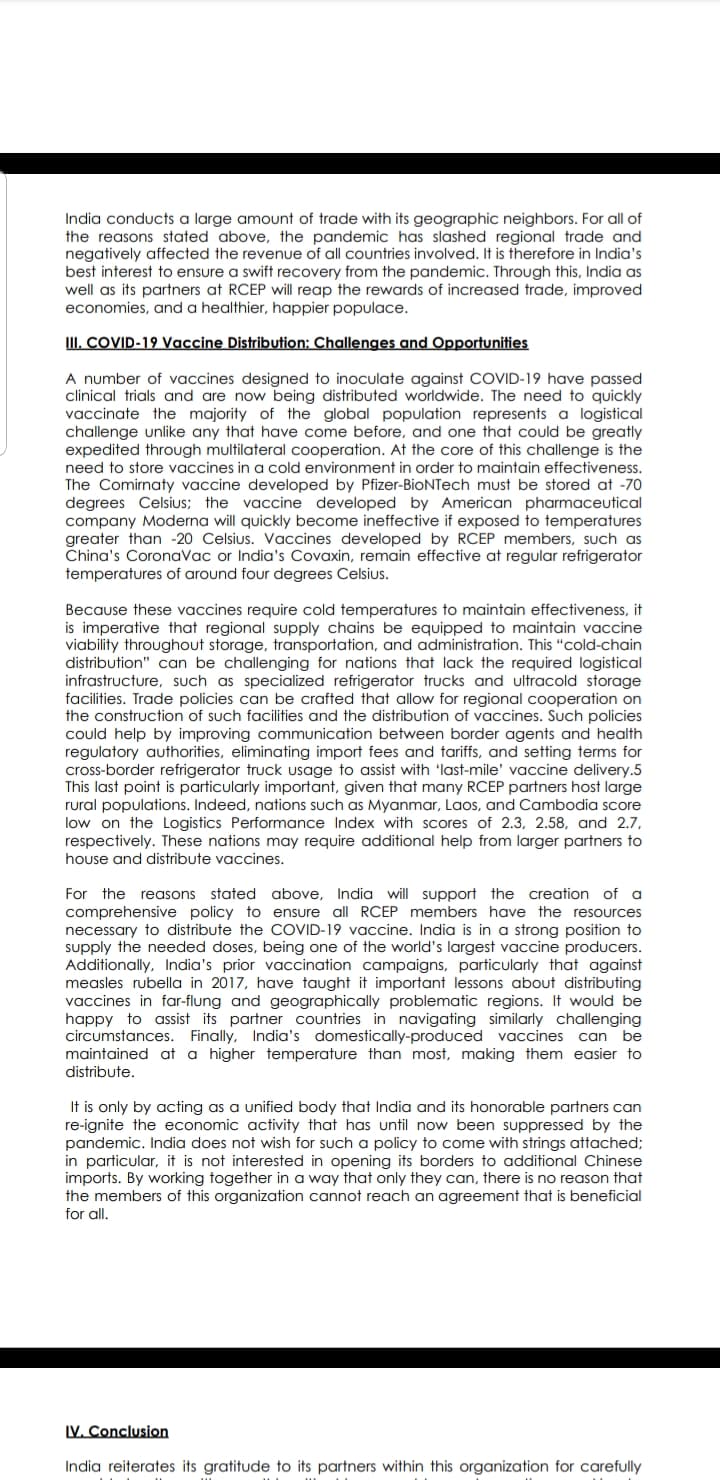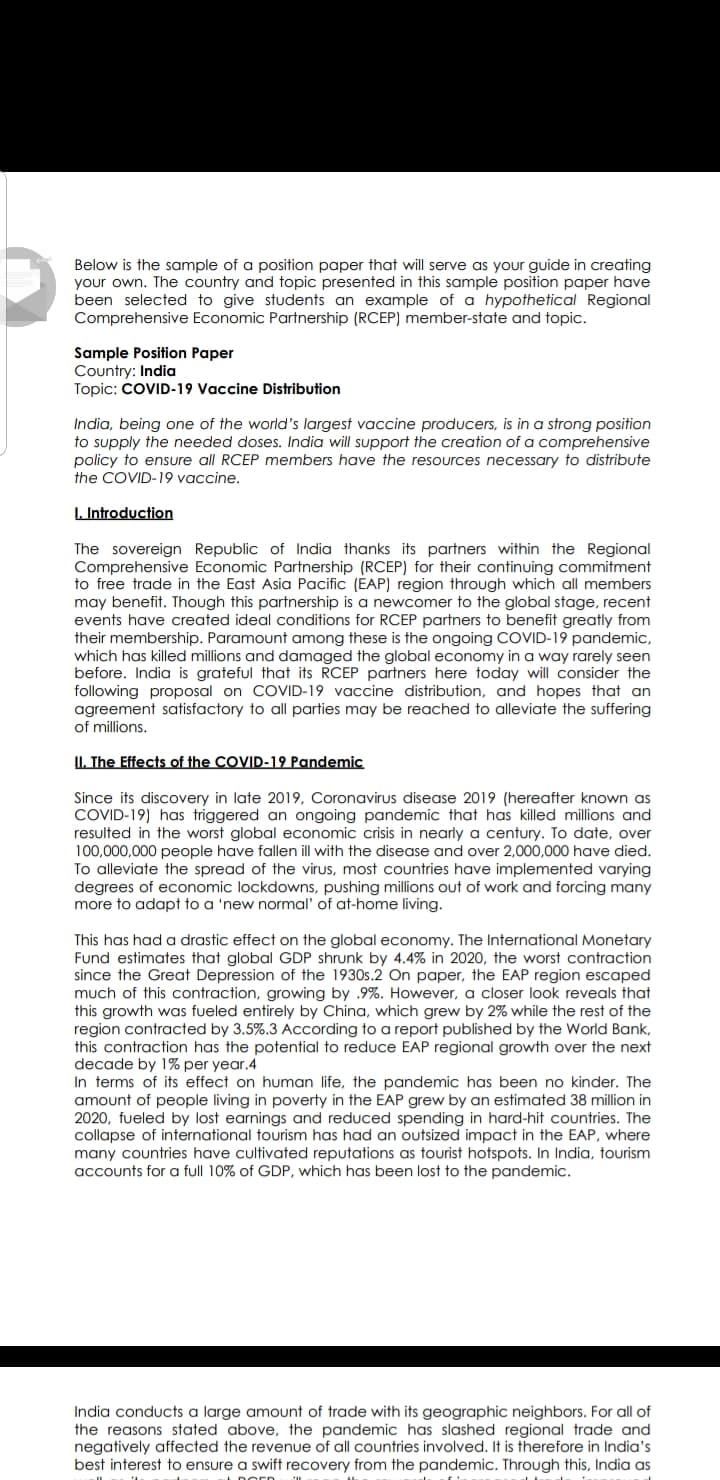Principles Of Marketing
17th Edition
ISBN:9780134492513
Author:Kotler, Philip, Armstrong, Gary (gary M.)
Publisher:Kotler, Philip, Armstrong, Gary (gary M.)
Chapter1: Marketing: Creating Customer Value And Engagement
Section: Chapter Questions
Problem 1.1DQ
Related questions
Question

Transcribed Image Text:India conducts a large amount of trade with its geographic neighbors. For all of
the reasons stated above, the pandemic has slashed regional trade and
negatively affected the revenue of all countries involved. It is therefore in India's
best interest to ensure a swift recovery from the pandemic. Through this, India as
well as its partners at RCEP will reap the rewards of increased trade, improved
economies, and a healthier, happier populace.
III. COVID-19 Vaccine Distribution: Challenges and Opportunities
A number of vaccines designed to inoculate against COVID-19 have passed
clinical trials and are now being distributed worldwide. The need to quickly
vaccinate the majority of the global population represents a logistical
challenge unlike any that have come before, and one that could be greatly
expedited through multilateral cooperation. At the core of this challenge is the
need to store vaccines in a cold environment in order to maintain effectiveness.
The Comirnaty vaccine developed by Pfizer-BioNTech must be stored at -70
degrees Celsius; the vaccine developed by American pharmaceutical
company Moderna will quickly become ineffective if exposed to temperatures
greater than -20 Celsius. Vaccines developed by RCEP members, such as
China's CoronaVac or India's Covaxin, remain effective at regular refrigerator
temperatures of around four degrees Celsius.
Because these vaccines require cold temperatures to maintain effectiveness, it
is imperative that regional supply chains be equipped to maintain vaccine
viability throughout storage, transportation, and administration. This "cold-chain
distribution" can be challenging for nations that lack the required logistical
infrastructure, such as specialized refrigerator trucks and ultracold storage
facilities. Trade policies can be crafted that allow for regional cooperation on
the construction of such facilities and the distribution of vaccines. Such policies
could help by improving communication between border agents and health
regulatory authorities, eliminating import fees and tariffs, and setting terms for
cross-border refrigerator truck usage to assist with 'last-mile' vaccine delivery.5
This last point is particularly important, given that many RCEP partners host large
rural populations. Indeed, nations such as Myanmar, Laos, and Cambodia score
low on the Logistics Performance Index with scores of 2.3, 2.58, and 2.7,
respectively. These nations may require additional help from larger partners to
house and distribute vaccines.
For the reasons stated above, India will support the creation of a
comprehensive policy to ensure all RCEP members have the resources
necessary to distribute the COVID-19 vaccine. India is in a strong position to
supply the needed doses, being one of the world's largest vaccine producers.
Additionally, India's prior vaccination campaigns, particularly that against
measles rubella in 2017, have taught it important lessons about distributing
vaccines in far-flung and geographically problematic regions. It would be
happy to assist its partner countries in navigating similarly challenging
circumstances. Finally, India's domestically-produced vaccines can be
maintained at a higher temperature than most, making them easier to
distribute.
It is only by acting as a unified body that India and its honorable partners can
re-ignite the economic activity that has until now been suppressed by the
pandemic. India does not wish for such a policy to come with strings attached;
in particular, it is not interested in opening its borders to additional Chinese
imports. By working together in a way that only they can, there is no reason that
the members of this organization cannot reach an agreement that is beneficial
for all.
IV. Conclusion
India reiterates its gratitude to its partners within this organization for carefully

Transcribed Image Text:Below is the sample of a position paper that will serve as your guide in creating
your own. The country and topic presented in this sample position paper have
been selected to give students an example of a hypothetical Regional
Comprehensive Economic Partnership (RCEP) member-state and topic.
Sample Position Paper
Country: India
Topic: COVID-19 Vaccine Distribution
India, being one of the world's largest vaccine producers, is in a strong position
to supply the needed doses. India will support the creation of a comprehensive
policy to ensure all RCEP members have the resources necessary to distribute
the COVID-19 vaccine.
I. Introduction
The sovereign Republic of India thanks its partners within the Regional
Comprehensive Economic Partnership (RCEP) for their continuing commitment
to free trade in the East Asia Pacific (EAP) region through which all members
may benefit. Though this partnership is a newcomer to the global stage, recent
events have created ideal conditions for RCEP partners to benefit greatly from
their membership. Paramount among these is the ongoing COVID-19 pandemic,
which has killed millions and damaged the global economy in a way rarely seen
before. India is grateful that its RCEP partners here today will consider the
following proposal on COVID-19 vaccine distribution, and hopes that an
agreement satisfactory to all parties may be reached to alleviate the suffering
of millions.
II. The Effects of the COVID-19 Pandemic
Since its discovery in late 2019, Coronavirus disease 2019 (hereafter known as
COVID-19) has triggered an ongoing pandemic that has killed millions and
resulted in the worst global economic crisis in nearly a century. To date, over
100,000,000 people have fallen ill with the disease and over 2,000,000 have died.
To alleviate the spread of the virus, most countries have implemented varying
degrees of economic lockdowns, pushing millions out of work and forcing many
more to adapt to a 'new normal' of at-home living.
This has had a drastic effect on the global economy. The International Monetary
Fund estimates that global GDP shrunk by 4.4% in 2020, the worst contraction
since the Great Depression of the 1930s.2 On paper, the EAP region escaped
much of this contraction, growing by .9%. However, a closer look reveals that
this growth was fueled entirely by China, which grew by 2% while the rest of the
region contracted by 3.5%.3 According to a report published by the World Bank,
this contraction has the potential to reduce EAP regional growth over the next
decade by 1% per year.4
In terms of its effect on human life, the pandemic has been no kinder. The
amount of people living in poverty in the EAP grew by an estimated 38 million in
2020, fueled by lost earnings and reduced spending in hard-hit countries. The
collapse of international tourism has had an outsized impact in the EAP, where
many countries have cultivated reputations as tourist hotspots. In India, tourism
accounts for a full 10% of GDP, which has been lost to the pandemic.
India conducts a large amount of trade with its geographic neighbors. For all of
the reasons stated above, the pandemic has slashed regional trade and
negatively affected the revenue of all countries involved. It is therefore in India's
best interest to ensure a swift recovery from the pandemic. Through this, India as
Dorn will
Expert Solution
This question has been solved!
Explore an expertly crafted, step-by-step solution for a thorough understanding of key concepts.
Step by step
Solved in 3 steps

Follow-up Questions
Read through expert solutions to related follow-up questions below.
Follow-up Question
Compose a position paper on how your local government unit responds
to the COVID-19 crisis and what is your advocacy on your chosen issue.
You need to be as objective as possible by citing valid and reliable
sources. You also need to make the necessary adjustments to your
sources’ authenticity and reliability based on the comments and
suggestions of the professor.
Solution
Recommended textbooks for you

Principles Of Marketing
Marketing
ISBN:
9780134492513
Author:
Kotler, Philip, Armstrong, Gary (gary M.)
Publisher:
Pearson Higher Education,

Marketing
Marketing
ISBN:
9781259924040
Author:
Roger A. Kerin, Steven W. Hartley
Publisher:
McGraw-Hill Education

Foundations of Business (MindTap Course List)
Marketing
ISBN:
9781337386920
Author:
William M. Pride, Robert J. Hughes, Jack R. Kapoor
Publisher:
Cengage Learning

Principles Of Marketing
Marketing
ISBN:
9780134492513
Author:
Kotler, Philip, Armstrong, Gary (gary M.)
Publisher:
Pearson Higher Education,

Marketing
Marketing
ISBN:
9781259924040
Author:
Roger A. Kerin, Steven W. Hartley
Publisher:
McGraw-Hill Education

Foundations of Business (MindTap Course List)
Marketing
ISBN:
9781337386920
Author:
William M. Pride, Robert J. Hughes, Jack R. Kapoor
Publisher:
Cengage Learning

Marketing: An Introduction (13th Edition)
Marketing
ISBN:
9780134149530
Author:
Gary Armstrong, Philip Kotler
Publisher:
PEARSON


Contemporary Marketing
Marketing
ISBN:
9780357033777
Author:
Louis E. Boone, David L. Kurtz
Publisher:
Cengage Learning